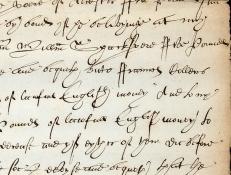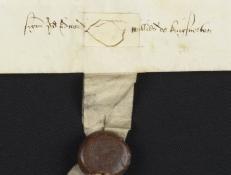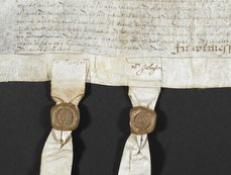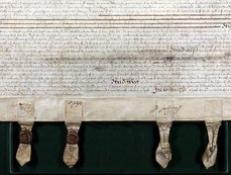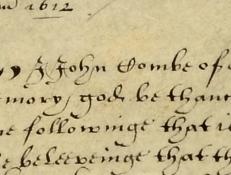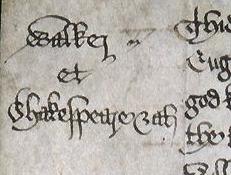Shakespeare purchased New Place, one of the largest houses in Stratford-upon-Avon, from William Underhill in 1597. He also purchased other properties, including one in London near the Blackfriars playhouse--the indoor theater where his acting company performed. The Blackfriars gatehouse, purchased from Henry Walker in 1613, may have been an investment by the business-savvy Shakespeare or a convenient London residence. This section includes documents relating to these two purchases, and to many other purchases as well.
All Documents
January 28, 1613
John Combe of Stratford-upon-Avon was a contemporary of William Shakespeare. Though Combe was from a far wealthier and more established family, by the second decade of the seventeenth century Shakespeare’s accumulated wealth placed the two men on an essentially equal footing.
January 22, 1613
John Shakespeare’s property in Henley Street, inherited by his son William in 1601, and now known as the Birthplace, had a frontage of about 90 feet. When an urban property changed hands, its boundaries were often defined by reference to neighboring properties.
March 11, 1613
In March 1613 William Shakespeare and three associates agreed to purchase the Gatehouse of the former Dominican priory in London known as “Blackfriars” from Henry Walker for the sum of £140. The indenture of bargain and sale is dated March 10.
March 10, 1613
In March 1613 William Shakespeare and three associates agreed to purchase the Gatehouse of the former Dominican priory in London known as “Blackfriars” from Henry Walker for the sum of £140. The indenture of bargain and sale is dated March 10.
March 10, 1613
In March 1613 William Shakespeare and three associates agreed to purchase the Gatehouse of the former Dominican priory in London known as “Blackfriars” from Henry Walker for the sum of £140. The indenture of bargain and sale is dated March 10.
January 28, 1613
The registered copy of John Combe’s will, shown here, carries the date of January 28, 1612 [i.e. 1613] in a heading which may give the impression of concluding the preceding will.
April 23, 1613
In March 1613 William Shakespeare and three associates agreed to purchase the Gatehouse of the former Dominican priory in London known as “Blackfriars” from Henry Walker for the sum of £140. The indenture of bargain and sale is dated March 10.
Summer of 1614
Stratford’s Corporation chamberlains presented their annual accounts, covering payments from the previous twelve months, in January each year. Although individual payments are usually undated, it can be assumed they were entered broadly in chronological order.
1613- 1614
In March 1613 William Shakespeare and three associates agreed to purchase the Gatehouse of the former Dominican priory in London known as “Blackfriars” from Henry Walker for the sum of £140. The indenture of bargain and sale is dated March 10.
1613- 1614
In March 1613 William Shakespeare and three associates agreed to purchase the Gatehouse of the former Dominican priory in London known as “Blackfriars” from Henry Walker for the sum of £140. The indenture of bargain and sale is dated March 10.

